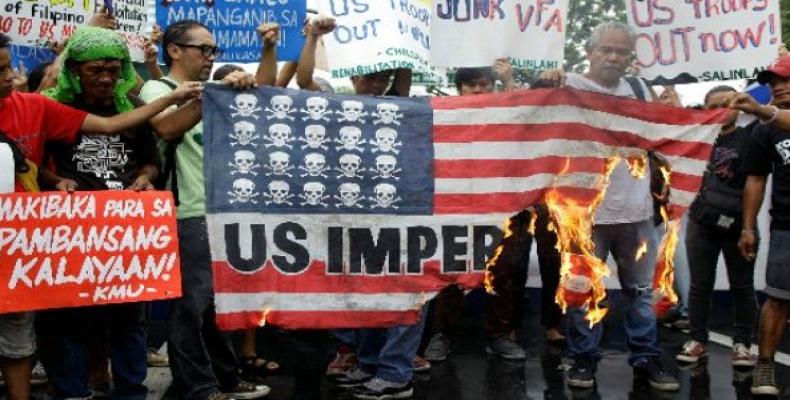Manila, July 5 (RHC)-- Anti-imperialist protesters and police clashed in front of the U.S. Embassy in Manila on Tuesday, with demonstrators demanding an end to U.S. meddling in Philippines affairs. Pushing and shoving ensued as protesters, attempting to march in front of the U.S. embassy, were met by police blocking their path.
A woman participating in the protest said that since the 1800's, the United States has interfered in the Philippines. She added that Washington, acting on behalf of its own geopolitical and economic interests, continues to use the Philippines as a “puppet and a doormat” and that the U.S. military is currently based on Mindanao island and elsewhere.
At the protest in front of the U.S. Embassy in Manila, a protest sign prepared by the May First Labor Movement, KMU, read “Resist Fascism and Imperialism! Fight Trump!” Other signs by the group read “US Troops Out Now!” and “Fight Against U.S. Intervention!”
Organizers of the demonstration said that the extent of U.S. influence on the Philippines, especially U.S. military presence, has long been a source of discontent and protests. They pointed out that armed colonization of the Philippines by U.S. forces began in 1899 in what was called the Filipino-American War. It was one of the most violent of all U.S. wars as the military invested heavily against guerrilla forces fighting against foreign occupation.
According to Revolutionary Frontlines, more than a million Filipinos were killed as the United States asserted its control over the Philippines from 1899 to the early 20th century.
The Filipino-American War was also noteworthy because of the significant numbers of disgruntled Black U.S. soldiers who defected and joined ranks with Filipino guerrillas. The most famous being David Fagan, a man from the state of Florida who rose to the rank of Captain in the Philippine Revolutionary Army under the command of Emilio Aguinaldo. The New York Times published an article describing Fagan as being a “highly skilled guerrilla who harassed and evaded large conventional American units.
Protesters, Police Clash in Front U.S. Embassy in Philippines

Articles en relation
Commentaires
Laissez un commentaire
Tous les champs sont requisPlus de visites
- Les États-Unis annoncent des restrictions en matière de visas liées à la coopération médicale internationale de Cuba
- Le chanteur populaire Paulo F.G. meurt dans un accident de voiture à La Havane
- Cuba : les migrants à Guantanamo sont une provocation et un affront à la souveraineté (+Photos)
- Le gouvernement cubain condamne les intentions des États-Unis concernant la base navale de Guantanamo
- Washington révoque la licence accordée à Chevron, "une décision nuisible et d'inexplicable"

